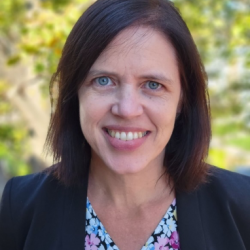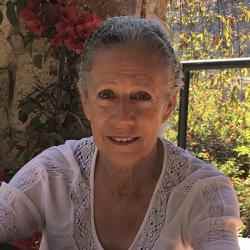
Claire Fallender
Claire has a deep sense of justice and fairness which has led her towards a career in building systems that support social entrepreneurs and young changemakers driving positive impact in the world.
Claire’s trajectory was highly influenced by supportive parents: A mathematician mother who challenged inflexible gender norms until she chose to pivot all her acumen into community leadership in public education and a business executive father whose work trips abroad taught Claire a sincere respect for a diversity of cultures not her own. They purposefully instilled in her a deep sense of fairness and a sense that she could do anything.
Claire’s changemaking journey started in high school where she became a leader in her school’s social change organization, overseeing a dozen student-led initiatives from housing to health to social justice. This work and early experiences volunteering with a community organization in Honduras exposed Claire first-hand to how well-intentioned people from outside a community could unintentionally do more harm than good.
In college Claire led a number of social justice initiatives. For instance, after witnessing labor violations so close to home as an intern with a leading garment worker’s union in New York, she launched the Students Against Sweatshops campaign at Yale, resulting in the administration approving a Code of Conduct to ensure the university’s ethical sourcing of its licensed goods. While studying in Chile, Claire was inspired by an Ashoka Fellow who demonstrated the kind of systems change impact only possible for someone who lives with the social problem and can skillfully put others into powerful roles. She graduated college and joined Ashoka’s team.
At Ashoka, Claire worked at every level of Venture, starting in D.C. and quickly moving to Brazil where she led the Venture/Fellowship program. She co-designed with a Fellow and launched Ashoka Brazil’s first youth changemaking program. Led by her passion for connecting the impact of social entrepreneurs and public policy change, she left Ashoka in 2004 to pursue a degree in Public Affairs at the Princeton School of Public and International Affairs where she eventually worked with UNICEF to develop the first inter-agency guidelines for supporting adolescent girls across 7 UN agencies.
After Princeton Claire joined the Oikos-Cooperation and Development, a social entrepreneur-led Portuguese organization in Mozambique, as a country leader in 2006. Her work catalyzed innovative approaches to support farmer and fishing cooperatives in their mitigation of the impacts of climate change and the HIV epidemic. Unsettled by the lack of support to Mozambican social entrepreneurs and changemakers, Claire returned to Ashoka to lead the Global Venture Program.
In the last decade, Claire has entreprenerd Ashoka’s LeadYoung initiative to help young people and now everyone to tell their Everyone a Changemaker story. She works across our global team of colleagues to develop tools and systems to align our global youth strategy and bring resources to support our core strategy. For example, she intrapreneured the four super key EACH dashboards.
In Claire’s free time, she loves to hike, make Halloween costumes and windchimes. She is grateful for the support of her husband and two young sons.
Ximena Abogabir: "If you are deeply convinced that your child is a changemaker, he or she will become one"

As part two of this two-part LeadYoung series, Ashoka asks Ashoka Fellow Ximena Abogabir, mother to Ashoka Fellow Gonzalo Muñoz, about her childhood, her role as a mother and her philosophy for parenting Gonzalo and her two other changemaker children.
Ximena: Yes, I grew up in Santiago. But it’s funny because my experience growing up was completely different from Gonzalo’s and my other children. It is difficult to see a linear connection that if this happens, this is the result. No, way. It is a conjunction of different things. In my case, I come from a family of immigrants that came to Chile after WWI. They had to make their way so I grew up in an entrepreneurial atmosphere where no one had a job, no one received a salary. My father exported fruit and my mother’s family were traders and they did very well. However, I didn’t like what I learned from my parents. From very little, I remember not liking the atmosphere growing-up. You could say it was materialistic. I was a strange girl in that house. I liked to learn new things so I studied a lot and focused a lot on school. The relationship I had with my parents was: “I want a different life. A meaningful life.” But I didn’t know how. I started participating in Catholic groups where I found people who were more similar to what I wanted to be. And then at university, when I met Gonzalo’s father, he came from a completely different background. He was from a close family with strong Catholic values of service and I fell in love with it. I wanted to be part of that family. The same as I was the strange child in my family, he was the only entrepreneur in his family. I think that what happened with our children is that they had the best from both families: strong values with leaders and entrepreneurs.
Ashoka: What happened when you had your own children?
Ximena: Going back a bit, my mother left when I was 10 and though my father and I were close he was more of a good friend than a parent. What it meant was that I had a lot of freedom growing up. I had a lot of space. No one really cared what I was doing. So with my own children, I think I gave them a lot of freedom too. I didn’t know another way. But different from my growing up, we did things together. I always involved them in my work and my main message was that work is fun and you can do amazing things. I never said “thank God it is Friday” because first studying and then work is how I found my best friends and had my best moments.
When I brought work home, I always asked them to work together with me. Even when we went on vacation, we would bring paper and pencils and make posters to invite the kids to activities we would organize for the local community. The money we raised we used to build a school.
Ashoka: The kind of involvement and exposure to positive work in the community seems key. How do you see that experience later helping them come up with their own ideas?
Ximena: We would build the idea together. When we built that school, I came up with some cultural ideas but they came up with all the sports activities. It wasn’t me designing what they would have to do or I would have to do. We would decide it together. I always had a very horizontal relationship with them. I always trusted them so much and I think that helped them trust themselves.
Ashoka: How do you feel this influenced your children to where they are today?
Ximena: I would say that the three of them are changemakers. Juan Carlos is a professor who is also an expert in improving public transportation in Chile and beyond. My daughter Ximena started off as an architect and studied lighting and now is a leading innovator in solar lighting initiatives. Gonzalo has launched Triciclos that has changed the recycling industry. All three of them shifted to public service at a particular moment. Today they all work on sustainability but in different ways.
Ashoka: What would you tell a young parent today?
Ximena: If you are deeply convinced that your child is a changemaker, she will become one. They react to the way we look at them. They may have tough moments along the way but trust them and give them space but be there for them. From me, I think I empowered my kids by believing in their ideas and being willing to help them.
Subscribe to the Early Changemaking Story Series
